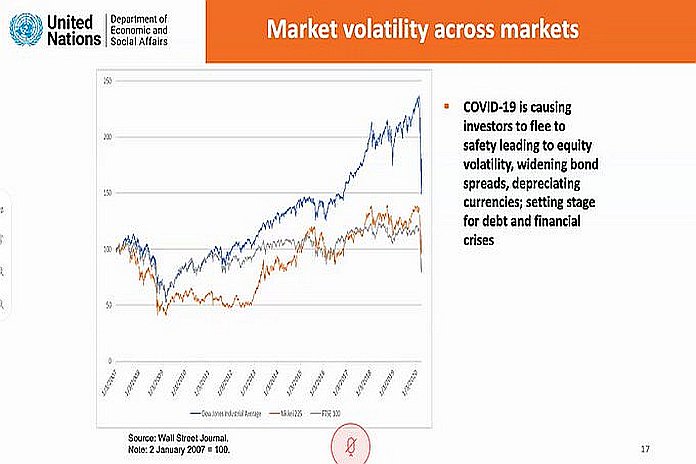NEW YORK, USA – As governments struggle to cope with the COVID-19 pandemic, billions of people living in countries teetering on the brink of economic collapse are being threatened further by a looming debt crisis, according to a new UN report released on Thursday.
In its report, the UN-led Inter-Agency Task Force on financing for development explores the steps that governments must take to avert debt overload and address the economic and financial havoc wrought by the pandemic.
“The global community was already falling behind in efforts to end poverty, take climate action and reduce inequalities”, said UN deputy secretary-general Amina Mohammed. “We have one chance to build back better together for people and for the planet”.
With recommendations based on joint research and analysis from more than 60 UN agencies and international institutions, the 2020 Financing for Sustainable Development Report outlines measures to address the impact of the unfolding global recession and financial turmoil – particularly in the world’s poorest countries.
The COVID-19 crisis has shaken global financial markets with heavy losses and intense volatility that has prompted investors to move around $90 billion out of emerging markets – the largest outflow ever recorded.
Particularly alarming for many Least Developed Countries (LDCs) is the prospect of a new debt crisis.
To mitigate this, 2020 Financing for Sustainable Development calls, among other things, suspending debt payments from LDCs and other low-income countries; strengthening the global financial safety net; and reversing the decline in official development assistance.
“We are far from having a global package to help the developing world to create the conditions both to suppress the disease and to address the dramatic consequences in their populations”, said UN secretary-general, António Guterres, during the recent launch of his Report on the Socioeconomic Impact of COVID-19.
“What is needed is a large-scale, coordinated and comprehensive multilateral response amounting to at least ten percent of global GDP”, he added. Beyond the immediate crisis response, the coronavirus pandemic should prompt the implementation of long-overdue measures to reset the world on a sustainable development path and make the global economy more resilient to future shocks.
To do this, the report recommends accelerating investment in resilient infrastructure; strengthening social protections; enhancing regulatory frameworks; and strengthen the international financial safety net and framework for debt sustainability.
While highlighting gaps, new challenges, and risks, the current crisis also provides a timely example of the potential of digital technologies.
As lockdowns and physical distancing have become the norm, digital communication tools have helped keep people connected and provided online platforms for children to continue their education.
But many workers in the so-called “gig economy”, dominated by service sector start-ups, are poorly protected against income losses in a recession. 2020 Financing for Sustainable Development addresses these gaps and other opportunities and challenges of digital finance.
“Only a collective response, inspired by shared responsibility and solidarity, will suffice to address the unprecedented challenges of the COVID-19 pandemic”, said Liu Zhenmin, Under-Secretary-General for Economic and Social Affairs and Chair of the Task Force that issued the report.
“Governments, development partners, the private sector and other stakeholders must work together to combat COVID-19 and support every effort to address its social and economic impacts,” he underscored.





